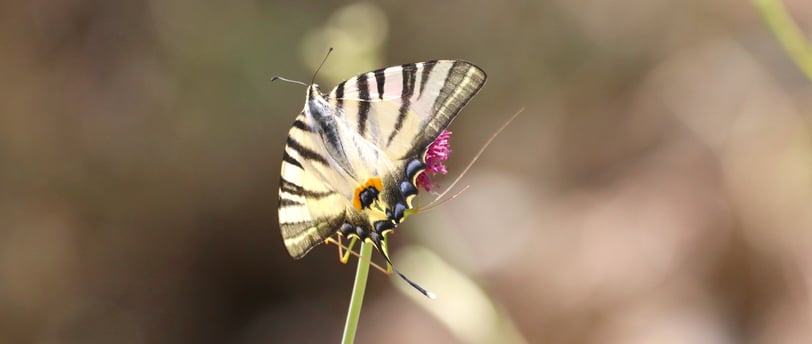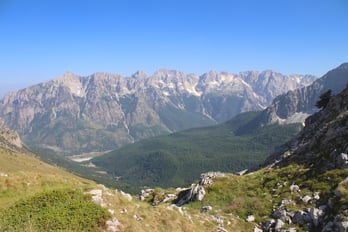Albania's Biodiversity: Exploring the Riches of a Geographically Diverse Country
WHY VISITING ALBANIA
1/23/20245 min lesen


Albania, located in the southeastern part of Europe, is a country known for its stunning geographical diversity and rich biodiversity. Nestled between the Adriatic and Ionian Seas, it shares borders with Italy (via the Adriatic Sea), Montenegro, Kosovo, North Macedonia, and Greece. Albania boasts a diverse landscape that includes mountains, forests, rivers, lakes, and a beautiful coastline. This unique geographical location has made Albania a hotspot for biodiversity, attracting nature enthusiasts and researchers from around the world.
One of the main reasons for Albania's biodiversity is its varied climate and topography. The country experiences a Mediterranean climate in the coastal regions, while the interior is characterized by a more continental climate. This diversity of climates supports a wide range of ecosystems, each with its own unique set of flora and fauna.
Mountains and Forests
Albania is home to numerous mountain ranges, including the Albanian Alps in the north, the Korab Mountains in the east, and notable mountains in the central and southern regions. These mountains provide a habitat for a variety of plant and animal species, some of which are endemic to the region. The dense forests that cover these mountains are home to bears, wolves, lynx, and a wide variety of bird species.
The Valbona Valley National Park, located in the Albanian Alps, is a prime example of the country's natural beauty. This protected area is home to rare and endangered species, such as the Balkan lynx and the golden eagle. Visitors to the park can explore its pristine landscapes, hike through the mountains, and witness the incredible diversity of flora and fauna.
The Gashi River Nature Reserve and the Shebenik-Jabllanica National Park, renowned for their pristine beech forests, further enrich Albania's ecological diversity. The Gashi River, a UNESCO World Heritage site, is celebrated for its untouched natural environment and biodiversity. The Shebenik-Jabllanica National Park, sprawling with lush beech forests, clear streams, and a variety of wildlife habitats, is crucial for maintaining ecological balance in the region.
Valbona valley, Albanian Alps
In addition to the northern areas, central and southern Albania boast significant mountainous landscapes, including the majestic Tomorri Mountain. Located in central Albania, Tomorri Mountain is revered for its cultural and religious significance as well as its natural beauty. The mountain is a biodiversity hotspot and features a range of ecosystems from Mediterranean to alpine. Its slopes are adorned with rich forests, offering habitats to diverse wildlife. Tomorri is also a popular destination for hikers and nature enthusiasts, offering stunning views and challenging trails.
These forests not only provide vital habitats for wildlife but also play a significant role in carbon sequestration, making them important in the fight against climate change. The protection and preservation of these old-growth beech forests in Albania are essential for maintaining the country's natural heritage and ensuring the survival of many species that call these forests home. Visitors to these areas are treated to a unique and unspoiled natural experience, highlighting the importance of conserving such precious ecosystems for future generations.
Rivers and Lakes
Albania is blessed with numerous rivers and lakes, which further contribute to its biodiversity. The country's longest river, the Drin, flows through the north of Albania, providing a habitat for a wide range of aquatic species. The Ohrid and Prespa Lakes, shared with neighbouring countries, are among the oldest lakes in the world and are home to numerous endemic species.
The Vjosa River, known as the last wild river in Europe, is a haven for biodiversity, recently turned into a National Park for its ecological values. Its crystal-clear waters support a rich variety of fish species, including the endangered European eel. The Vjosa River and its tributaries are also home to otters, turtles, and a plethora of bird species, with its emblematic species, the Egyptian vulture.
Coastline and Marine Life
Albania's coastline stretches for approximately 450 kilometers along the Adriatic and Ionian Seas. The pristine beaches, hidden coves, and crystal-clear waters attract tourists and nature lovers alike. The coastal areas are home to a variety of marine life, including dolphins, sea turtles, and a wide range of fish species.
The Karaburun-Sazan National Marine Park, located on the southwestern coast of Albania, is a protected area that showcases the country's marine biodiversity. The park is home to rare and endangered species, such as the Mediterranean monk seal and the loggerhead turtle. Diving enthusiasts can explore the park's underwater caves, reefs, and shipwrecks, and witness the vibrant marine life that thrives in these waters.
Protected Areas & recognition
Albania's National Network of Protected Areas covers over 800 areas, around 16% of the country's territory. These include RAMSAR Convention wetlands like Prespa Lakes, Karavasta Lagoon, Butrinti Lake, Skader Lake, and the Ohrid and Prespa Lakes UNESCO Biosphere Reserve. BirdLife International has identified 16 Important Bird Areas (IBAs) in Albania, now formally included in the country's Protected Areas as "Protected Areas of International Importance." The Emerald Network, under the Bern Convention, comprises 25 sites critical for preserving Albania's unique natural values.
Conservation challenges
Recognizing the importance of preserving its natural heritage, Albania has taken significant steps to protect its biodiversity. The country has established numerous national parks, nature reserves, and protected areas to safeguard its unique ecosystems. These protected areas not only conserve the flora and fauna but also provide opportunities for sustainable tourism and research.
Albania faces significant conservation challenges, particularly in balancing development with the protection of its unique natural environments. A prominent example is the Narta Lagoon, an area of ecological significance that has become a focal point of environmental concern. The lagoon, part of the Vjosa-Narta Protected Landscape, is a critical habitat for various bird species, including some that are endangered. However, recent plans to construct an airport nearby and the push for intense tourism development pose serious threats to this fragile ecosystem. These projects have the potential to disrupt the lagoon's biodiversity, alter its delicate water systems, and impact the bird populations that depend on this habitat for breeding and migration. Environmentalists and conservationists argue that such development not only endangers the lagoon's ecological balance but also threatens the overall environmental integrity of the region. The situation at Narta Lagoon underscores the broader challenge faced by Albania: finding sustainable ways to develop economically while preserving the natural heritage that is crucial for the country's biodiversity and environmental health.
Albania has also faced controversy over the construction of hydropower plants, especially in protected areas like the Vjosa River, one of Europe's last wild rivers. Environmental NGOs and activists have been actively fighting against these plans, arguing that they threaten biodiversity and the natural landscape.
Albania is also a party to several international agreements and conventions aimed at conserving biodiversity. The country actively participates in initiatives such as the European Green Belt, which aims to protect and restore ecological corridors across Europe.
Airport in Narta. Credits: Reuters YouTube Channel
Conclusion
Albania's geographical diversity and varied climate have created a haven for biodiversity. From the majestic mountains and dense forests to the winding rivers and pristine coastline, the country offers a wealth of natural wonders to explore. By prioritizing conservation efforts and sustainable tourism, Albania is ensuring that future generations can continue to appreciate and benefit from its rich biodiversity.


Addresse
Kannerstraße 5
12055 Berlin
Deutschland
Kontakt
0049 1772187884
albaniaecowings@gmx.de


